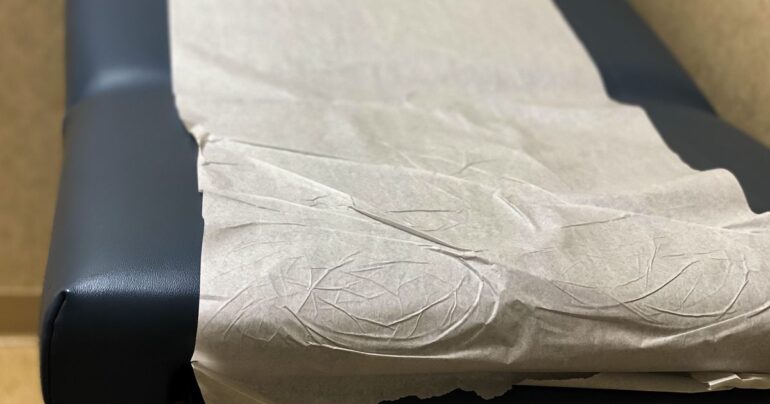🔴 Website 👉 https://u-s-news.com/
Telegram 👉 https://t.me/usnewscom_channel
Editor’s note: This story was originally published in 2022. In light of new discussions and developments related to reproductive rights, HuffPost Personal is resharing it.
One morning this past December, I woke up early to listen to judges with lifetime appointments question lawyers in a process that may ultimately rob people of their reproductive freedom. And week after week since then, I continue to hear judges and lawyers and politicians speak on issues they have no business speaking on ― as far away from people and their real lives as voices from another planet.
During these moments, I think of a little girl in an exam room I met many years ago.
She was my patient. She was 11.
It was my first year in practice doing bread-and-butter primary care. Sophia’s mom had brought her in for stomach pain. When I got to her menstrual history, her mom said Sophia had gotten her period but then it had stopped. I reassured her and said sometimes at the start of menstruation, there can be some irregularity and that is not uncommon at all. The mother then left the room and it was just me and Sophia.
She was quiet and soft-spoken — a par-for-the-course, awkward adolescent who was uncomfortable interacting with an adult. She answered my questions with one-word responses and didn’t quite know where to look.
When I left the room, I heard the booming voice in my head of an ER doctor who had trained me: “Don’t be the ass who doesn’t order the pregnancy test.” This was one of her clinical teaching pearls: Many young docs will order the blood tests, the ultrasound, the CT scans, but skip the most obvious, most basic test and spend tens of thousands of dollars to work up a patient when the “diagnosis” is actually pregnancy.
Hence, don’t be the ass who doesn’t order the pregnancy test. So I ordered it.
A few minutes later, our medical assistant came to me, panicked, and handed me a positive test. “Run it again,” I asked her, agape. She ran it again. Positive. “Run it again,” I sputtered — to buy some time and gather my wits and hope by some miracle it would produce a different result. Positive.
She was my patient. She was 11. She was pregnant.
I sat Sophia’s mom down in another room and quietly explained to her that the pregnancy test came back positive.
I had to repeat myself multiple times in various ways for her to comprehend that Sophia was pregnant. Shock, tears, a cellphone call. Soon a breathless dad showed up, followed by a somber family priest, and then the cops. I remember the adults weeping in a prayer circle in a separate room and the feeling of watching a nightmare unfold, and I had to remind myself that, sometimes, the job is bearing witness to the worst day of someone’s life.
I tried in vain to coax the truth of what happened out of Sophia, sitting next to her with a large anatomy atlas flipped open in my lap. She said nothing. I was thankful there was a female police officer that was among the throng at the clinic. It was this officer, when permitted to speak with Sophia, who discovered the identity of the family member that did this awful, unspeakable thing to her. And when the cops left to arrest that relative, they headed to church, because the perpetrator was at choir practice.
“I remember the adults weeping in a prayer circle in a separate room and the feeling of watching a nightmare unfold, and I had to remind myself that, sometimes, the job is bearing witness to the worst day of someone’s life.”
I recall my focus ― my clear understanding that my only job was to ensure that I was there to protect my patient. That whatever happened, my job was to make sure that at every moment, Sophia was centered, and her mental and physical health were the priority. To make sure that she could find her way, in the midst of this trauma and unspeakable crime, and that her precious life was protected.
And part of that included a pregnancy termination. We would make certain she had access to it and was able to get it immediately.
There was no question that Sophia’s life mattered and it mattering meant that she would not be forced to give birth at age 11.
I think about Sophia all the time, especially these days. I think about all the Sophias in clinics like mine, as abortion protections are struck down in state after state ― protections falling like wicked dominoes. I think about the words “except in cases of the life of the mother.” The choice made that evening of the awful revelation was for the life of the mother. A mother that should have never been and thankfully wasn’t.
And though it might be easier to build consensus around abortion access for an 11-year-old raped by a family member, the truth is that nobody, anywhere, under any circumstance or in any situation should be forced to give birth. Forced birth should never be a reality.
Sophia is in her 20s now. I wonder how she has healed, how she has processed that trauma. Did she get to go to college? Has she been able to trust an intimate partner? Has she been pregnant on her own terms at the time of her choosing? Does she have a child? I can see her wide face and her soft smile in my mind’s eye and I know now, just as I knew then, that the decision to terminate Sophia’s pregnancy, supported by the ones who loved her the most, was a pro-life decision.
One of the things my mind conjures up from that horrible day is the feeling that the clinic was crowded. There was Sophia, her mom, then her dad and the priest, and later the cops. There was the crying and the praying and the disbelieving and the believing. I remember how small Sophia looked. Her small face and her small hands and her small hips and how this big, awful thing could happen to someone so small took the wind out of the place.
I remember how tiny that clinic room felt. There was no room for politicians signing evil bills flanked by child props as old as Sophia, no room for Supreme Court justices who claim to value life while wondering aloud how pregnancy can be an undue burden. No room for those extraneous, unnecessary, useless others in that most intimate of spaces. Our clinic rooms will always be too small for anybody but providers and our patients.
And we will fight for this sacred space, fight for it to be free of cynical politicians and their divisive games. They have never been invited in and we are not about to sit back or stand by while they force their way in.
Names and specific details have been changed to protect the privacy and safety of individuals mentioned in this essay.
Dipti S. Barot is a primary care doctor and freelance writer in the San Francisco Bay Area. You can follow her on Bluesky @diptisbarot.bsky.social and Twitter at @diptisbarot.
Note: This piece was originally published in May 2022. We are republishing it now as part of HuffPost Personal’s “Best Of” series.
Do you have a compelling personal story you’d like to see published on HuffPost? Find out what we’re looking for here and send us a pitch!

